Baby Grunting in Sleep – Causes and When to Call
In this article:
- Why is my baby making sounds in their sleep?
- Do babies breathe out their nose?
- Is my baby grunting because they are hungry?
- So, why is my baby grunting when sleeping?
- Other noises and their reasons
- When to contact a doctor about your baby’s grunting
There are so many worries when bringing home your baby. If they came with instructions, then it would be a little easier and less nerve-wracking but, unfortunately, that isn’t the case.
Being a new parent means that you have no idea what to expect, and the unknown can definitely be worrying! We all want reassurance that what our babies are doing is normal and that they aren’t in any danger.
It is important to remember that newborns are still learning how to breathe in patterns, therefore, grunting noises and rapid breathing are to be expected from newborn babies.
You may find yourself worrying about your baby’s breathing; they breathe rapidly during the day and at night their breathing slows right down- and sometimes, their breathing may even pause! Whilst this can be scary- as I know from first-hand experience- it is completely normal!
Why is my baby making sounds in their sleep?

Babies are very noisy sleepers – particularly newborns. Newborns spend around half of their time sleeping in a state of ‘active sleep’. This state of sleep is light, and they will seem very restless – they will move a lot and even sometimes cry or whimper in their sleep. This is unlikely to be something you would need to worry about and as your baby gets older these phases of active sleep reduce.
Do babies breathe out their nose?
Yes. Babies mainly breathe out of their noses, not their mouths. In fact, this is the optimum way all humans should breathe unless we are unwell and have a blocked nose. We want our tongues to rest on the roof of our mouth as we breathe through our nose during sleep. If your baby experiences mouth breathing and snoring it’s probably nothing to worry unduly about, but is something that may be worth investigating as it can be associated with things such as tongue-tie which can impact feeding, and
Is my baby grunting because they are hungry?
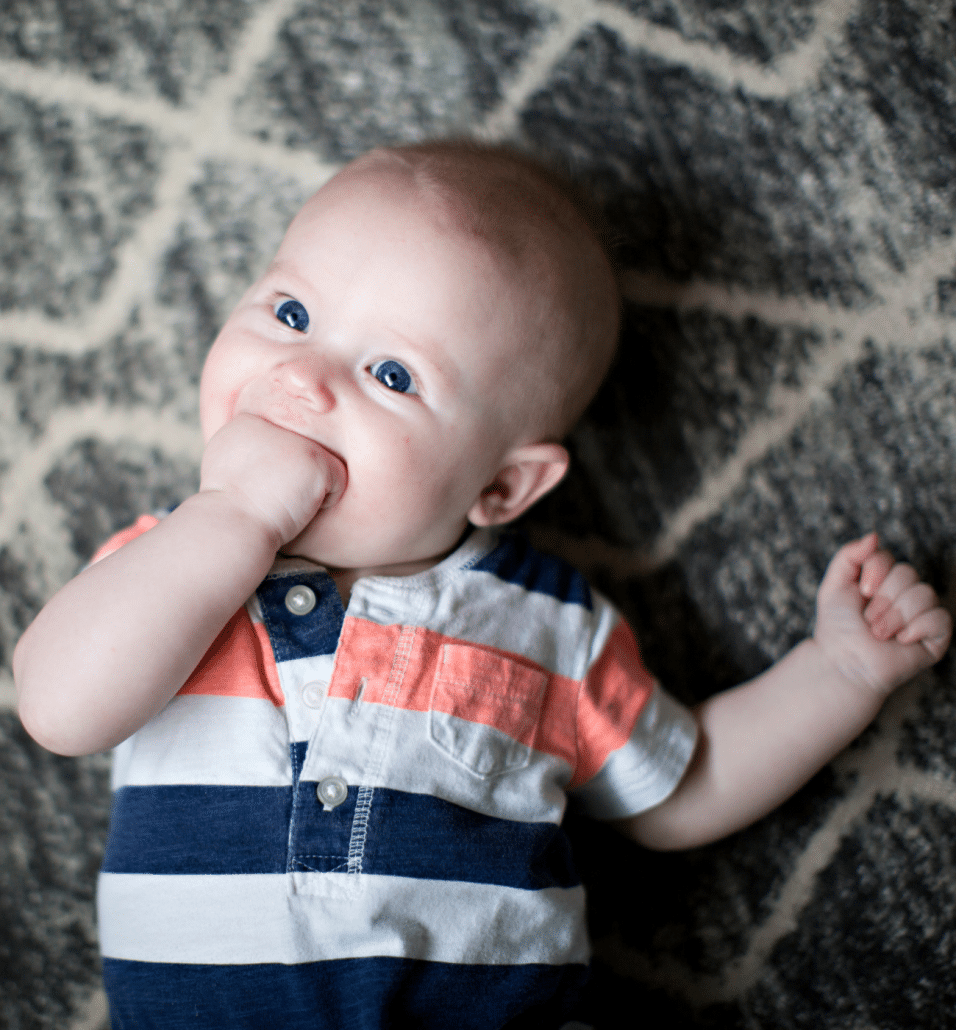
Is your newborn baby grunting in its sleep? Babies make many wonderful yet weird sounds whilst they are sleeping. When you first bring your baby home, you may find that you struggle to sleep. You will most likely end up spending a large portion of your time peering into the Moses basket, to check if your baby is still breathing when they are too quiet, or when your baby is grunting in their sleep or making bizarre noises!
If you want to know if your baby is grunting in their sleep because they are hungry, the answer is: probably not.
So, why is my Baby Grunting When Sleeping?
Babies just make lots of noises so grunting is more likely associated with digestive processes. They are probably trying to pass wind or poop. If your baby is hungry they will show signs such as rooting, lip smacking or they will bring their fist to their mouth.
Furthermore, newborn babies usually have irregular breathing. This is because young babies still figuring out how to breathe in patterns. Newborn babies often breathe rapidly whilst they are awake and breathe very slowly- or even take pauses in their breathing- whilst they sleep. When you combine their irregular breathing with the unusual, yet typical, newborn sleep sounds- it is no wonder that we worry!
What do these baby sleep sounds mean? Here are some reasons why your baby may grunt in their sleep:
Babies are Naturally Light Sleepers
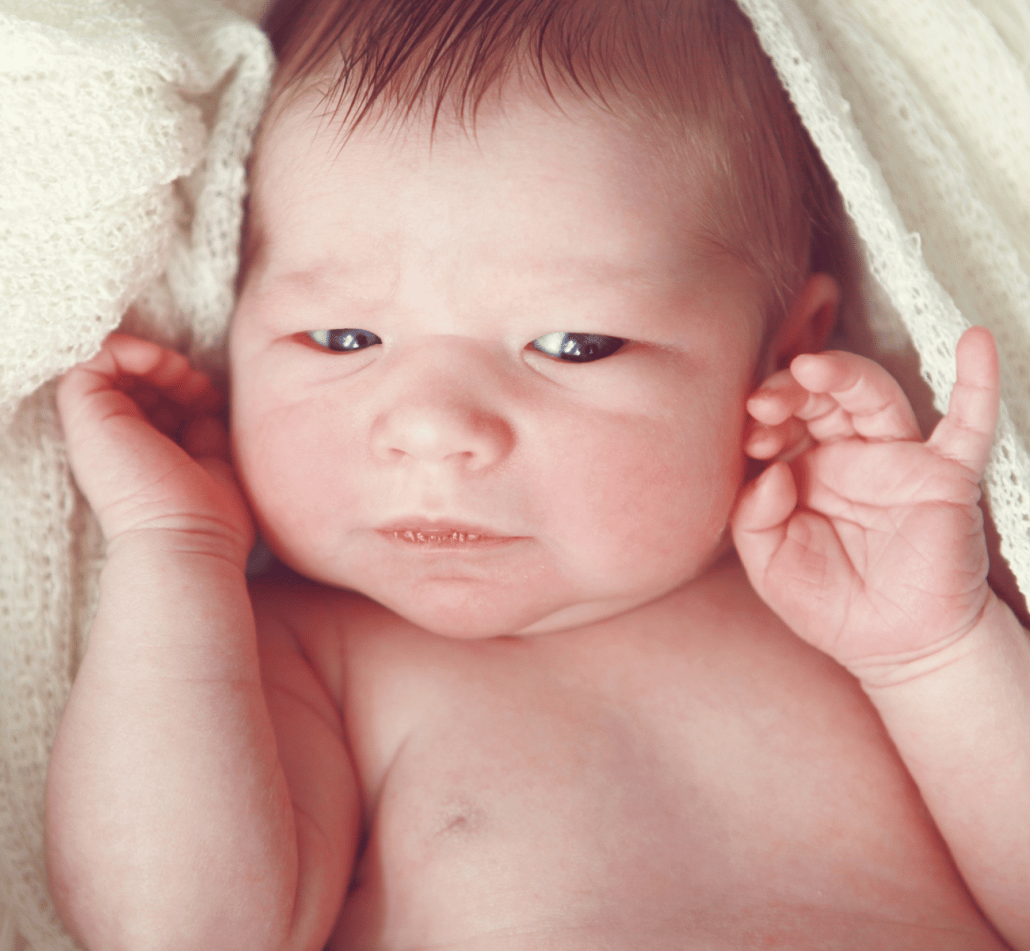
Newborn babies are naturally light-sleepers- you may find that your baby is often restless during their sleep and that they may make all sorts of noises whilst they sleep, so, if you hear your newborn grunting in their sleep, this is completely normal!
On the contrary, you may find that your baby can sleep through very loud noises!
Your Baby is Constipated

When adults use the toilet, we do so either standing or sitting up- this is because gravity helps us with our bowel movements.
Since babies lay down horizontally for the majority of the day- they may have trouble going to the toilet.
If your baby grunts, becomes red in the face when they are trying to push out a stool, cries when they are passing stools and they have hard bowel movements with a pebble-like consistency, your baby is most likely constipated.
If you think your baby is constipated, you should consult your doctor for advice.
If your baby has a bloated belly, blood in their stool, a fever or vomiting, you should contact a doctor immediately.
Your Baby Has Acid Reflux
If your infant is grunting in their sleep (or gurgling!)- they may have acid reflux. Acid reflux is common in babies- and often starts before your baby reaches 8 weeks of age, and resolves itself by the time they are one year old.
Like with constipation- your baby lying horizontally for the majority of their time can be a contributing factor.
Symptoms of acid reflux include:
- Making gurgling or grunting sounds during digestion
- Being unsettled during feeding
- Crying and not settling
- Your baby not gaining the correct amount of weight (as they are unable to keep food down)
- Coughing
- Hiccuping
- Bringing or milk or vomiting
You can read about how to ease the symptoms of reflux on the NHS website here:
https://www.nhs.uk/conditions/reflux-in-babies/
Your Baby has Grunting Baby Syndrome
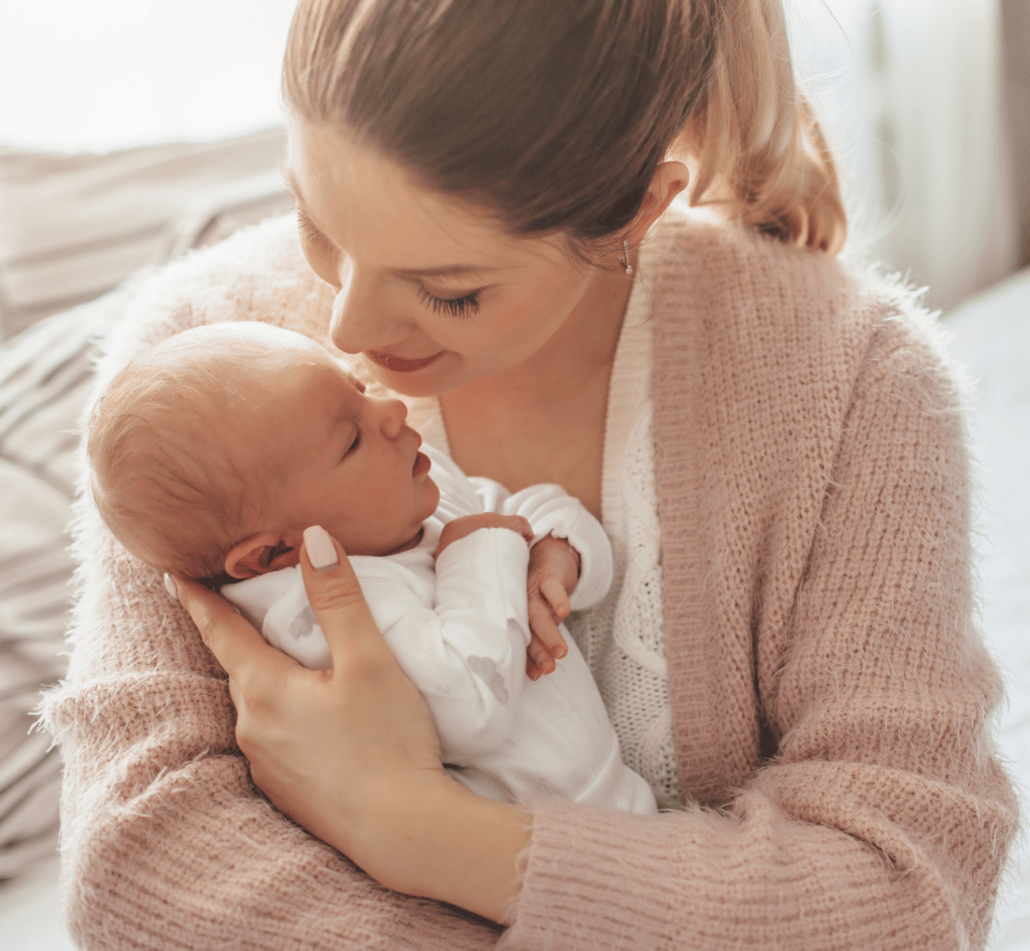
Grunting baby syndrome may appear to be like constipation upon first glance- but it is actually different.
Whilst constipation is caused by a hard stool, grunting baby syndrome is caused by the baby’s body being unable to recognise when it needs to pass a bowel movement.
For us, passing a stool is a natural movement; our stomach muscles naturally flex and our pelvic muscles relax, but for a baby, it requires a little more recognition and coordination.
Grunting helps your baby’s stomach muscles to tense, so they will often grunt to aid in passing waste.
However, whilst this grunting flexes your baby’s stomach muscles, it doesn’t relax your baby’s pelvic floor muscles- so, rather than the pelvic muscles and abdominal muscles working in unison- the baby grunts and tenses their stomach muscles repeatedly until the pelvic muscles eventually relax to let the stool passing stool exit the baby’s body.
This can unfortunately be quite uncomfortable and painful for your baby.
There is no treatment for grunting baby syndrome- and it should resolve itself by the time your baby is 3-4 months old- or when your baby learns to naturally relax their pelvic muscles.
Here are the signs of grunting baby syndrome:
- Your baby tenses their abdominal muscles when passing a stool
- Your baby cries or screams when passing a stool
- Your baby strains when passing a stool
- Your baby turns red or dark purple when passing a stool
These symptoms should pass on their own within 5-10minutes.
Your Baby has Mucus in their Nasal Passages
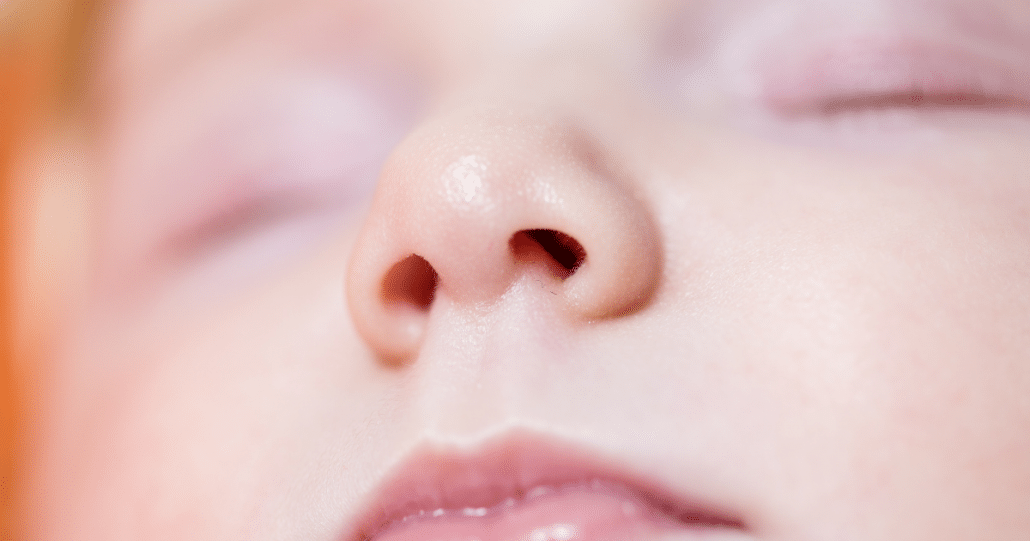
With our babies being so small, it means that they also have very small noses and nasal passages! It is very easy for your newborn’s narrow nasal passage and adorable little nose to become blocked with mucus- which can cause some strange noises (as well as coughing and sneezing!) as our babies primarily breathe through their noses to make feeding easier.
It is normal for newborn babies to have a lot of mucus in their nasal passageways.
Your Baby’s Sleep Environment is Unsafe
I am sure that we have all heard about safe sleep guidelines and how important it is to follow them. If your baby is sleeping in an unsafe environment- it may cause difficulty breathing which can result in grunting and other odd noises.
You can read more about safe sleep guidelines here: https://www.nhs.uk/conditions/baby/caring-for-a-newborn/reduce-the-risk-of-sudden-infant-death-syndrome/
Other Noises and their Reasons
Is your newborn making noises whilst sleeping? There are a number of strange noises your baby could make, here are a few and some reasons behind them:
Rattle noise
Your baby has mucus in their nose, and, just like mummy and daddy and it can cause a rattling noise. You can get a newborn nasal spray from the chemist for your baby.
Whistling noise
Newborn babies use their noses to breathe and not their mouths. The reason for this is that babies can eat and breathe at the same time which is really clever however this also means that dried milk can be in the same passageway for breathing which can create a whistling noise.
Gurgling noise
Gurgling is often your baby clearing their throat or baby talking in their sleep.
Giggling Noise
Giggling noise is exactly how it sounds, some babies giggle in their sleep from around 4 weeks old, it just means your baby is having a nice happy dream.
When to Contact a Doctor about your Baby’s Grunting
This is very unlikely to be something you need to worry about. It’s very common for newborns to be very noisy while they are sleeping as they spend 50% of their time sleeping in a state of ‘active sleep. They will often grunt, wheeze, have irregular breathing and cry. This is thought to be because their digestive and respiratory systems haven’t matured enough.
However, you should contact the doctor if any of the following are true:
- Your Baby is grunting every time your baby breathes
- Your baby has a fever
- Your baby is breathing faster than 60 breaths per minute
- Your baby cannot be roused from their sleep
- Your baby appears to be blue
A doctor may prescribe baby melatonin if your baby is struggling to sleep, although it is not usually prescribed to babies under 3 years of age, as it is a supplement- not a medication.
Frequently Asked Questions | FAQs
When should my baby transition into their own room?
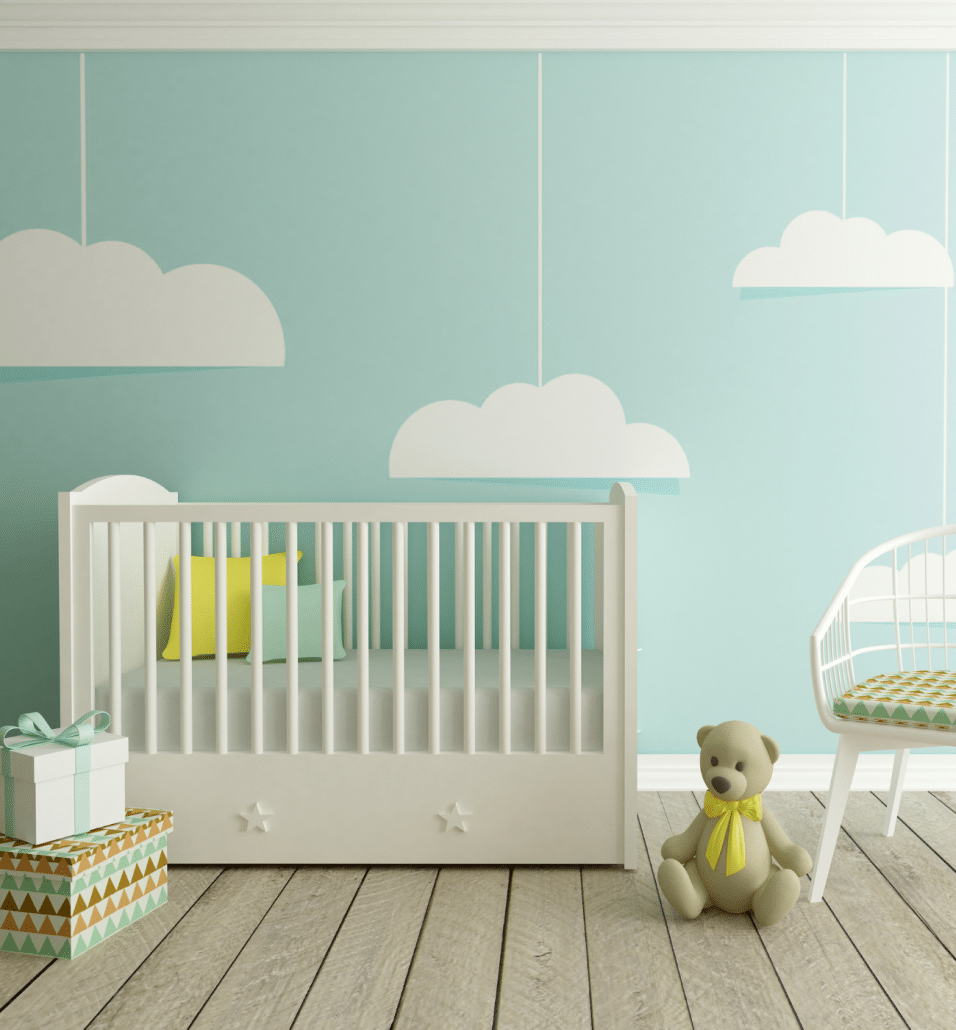
The NHS advises that the safest place for your baby to sleep until they are 6 months old is in a separate cot, crib or moses basket in the same room as you. This advice is echoed by the safe sleep charity The Lullaby Trust because room sharing for the first 6 months of life is associated with a lower risk of Sudden Infant Death Syndrome (SIDS).
But beyond 6 months the choice is yours – if your child is still waking for a feed in the night then it can be helpful to keep them in the same room so you don’t have to keep going into a different room in the middle of the night. But really there is no right or wrong here – I work with many families who want to keep room sharing for many reasons – either they like to remain close to their baby or they simply don’t have the space in the rest of their home. Certainly, you shouldn’t feel pressure to move your baby into a different room because other people say they should be in another room.
What is white noise?
This might get a little technical, but white noise is a sound that is made by combining all the sound frequencies that are audible to the human ear. It sounds like static. Because it contains all sound frequencies, it’s particularly good at masking any unwanted noises. This is helpful for sleep because if you have unwanted noises that occur in or outside your home that may wake you or your child up, then white noise can mask these sounds so that they are less likely to distract and wake you.
White noise, though, is quite unpleasant to listen to sometimes, and some families I work with really hate it. In this case you may instead prefer brown noise which contains lower sound frequencies that relate to the sound water or wind make so it sounds far more natural – which is just more pleasant and natural to the ear. Brown noise is associated with relaxation, focus and overall sleep improvement.
Can white noise help soothe my baby?
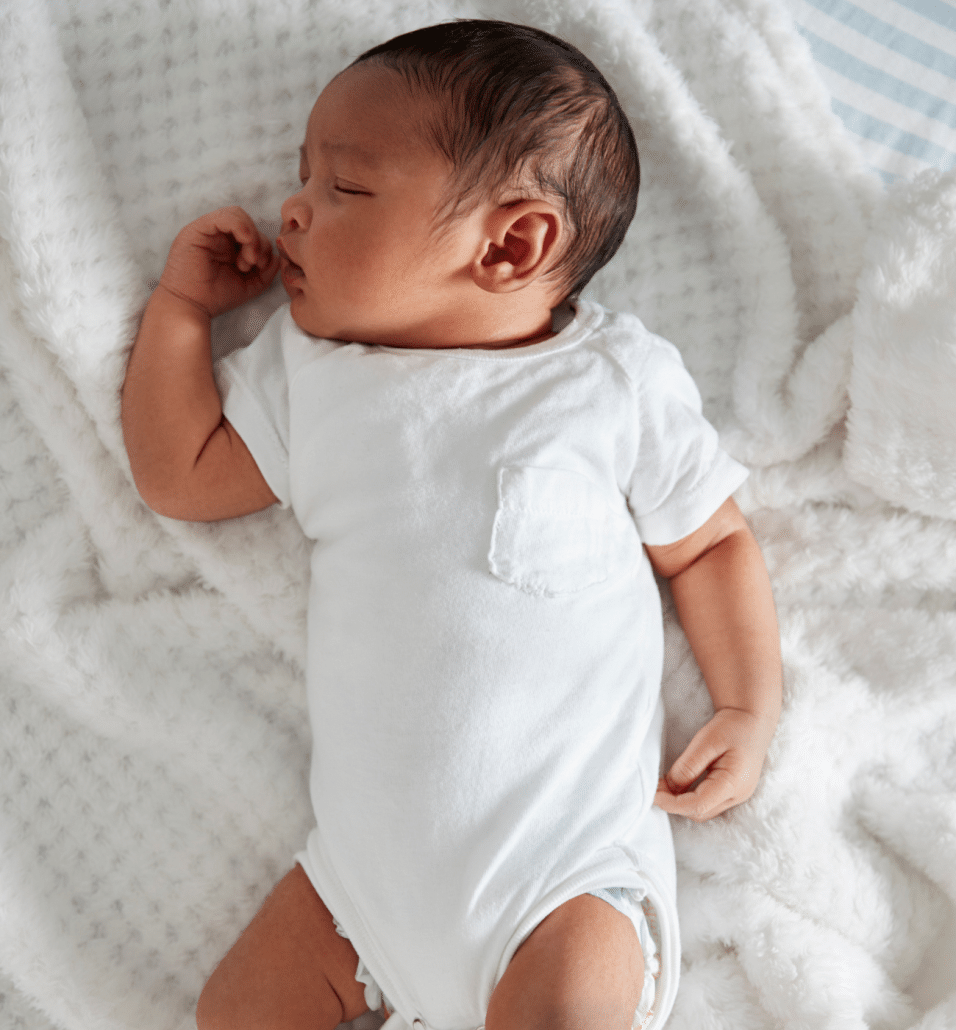
For newborns white noise can be especially helpful because when they are in the womb they were exposed to the constant sound of their mother’s heartbeat and the blood whooshing around her body. When a baby is first born the silence can actually be quite scary for them, because they are not used to quiet environments, so you may find that white noise can be helpful so soothe them – there are white noise machines that can mimic the sounds heard in the womb.
As your baby gets beyond the newborn phase white noise alone becomes less effective to soothe a crying baby, but instead it does remain a useful tool to help prolong sleep. If you use white noise throughout the night it can help to mask other noises that occur around the home, if you’re room sharing and someone snores it can be helpful to drown out that sound. During the early hours if someone in your home wakes up to get ready for work, those noises will be less of a distraction with white noise. I always recommend families use it with young babies, but I think it’s helpful for all age groups, even adults.
The key is making sure the white noise is a consistent sound, it remains on all night and you place in front of the source of any noises. There is evidence that brown or pink noise is better for babies.
What are wake windows and should I use them for guidance?
Wake windows are all the rage at the moment and they are a very recent phenomenon in the infant sleep world. Wake windows simply refer to the amount of time your baby is awake between periods of sleep. You will notice when you Google ‘wake windows’ that these windows will vary from source to source. This is because they aren’t actually evidence-based or proven in any kind of sleep science.
However, the concept of having a rhythm to your day where you put your baby down to sleep at regular age-appropriate intervals is important. These rough timings are helpful, because it can sometimes be very hard to follow baby’s tired cues and wake windows will allow you to avoid getting in a position where your baby is an overtired mess.
Wake windows vary by age, for example, a 12 month old’s wake windows will be very different to a newborn’s wake windows.
You can read all about wake windows by age in our article.
My baby is crying in sleep, does that mean they would be overtired?

This depends on the age of the baby. If your baby is a newborn this is probably not because they are overtired. Newborns spend 50% of their time sleeping in active sleep where they move around a lot and make lots of noise. They can appear to be dreaming and even crying in their sleep. This is normal and is not something to worry about and it will improve over time.
If you have an older child, however, a baby crying in their sleep can be associated with night terrors. Night terrors tend to happen during the first part of the night and your child may scream and cry while still being asleep. They do not remember these episodes, and if you wake them from these episodes they can become more distressed. Night terrors are associated with overtiredness and periods of fever (illness).
What should I do if my baby is crying in their sleep?
If your child is not awake, then you do not need to do anything as you risk waking them and them becoming more distressed. However, it can be hard to watch your child be in distress, even if they are asleep. So if your baby is crying in their sleep, you might simply want to hold a comforting hand on their chest or back until they calm.
Is there a reason my baby would fight sleep?
Absolutely. The most common reason a baby might fight sleep is actually because they are too tired. Our drive to sleep is regulated by ‘sleep pressure’ which makes us feel more tired throughout the day. Our body has a state of maximum sleep pressure and in babies napping can release some of that pressure. Sleep pressure is at its highest in the evening before bed when melatonin (the sleep hormone) is at its highest. However, when we get ‘overtired’ and our body has gone beyond its maximum point of sleep pressure, the body starts to produce cortisol which is the hormone associated with wakefulness. Cortisol is also produced if we are stressed, and it puts us into a state of ‘fight or flight’. Cortisol makes it hard for us to fall asleep – it’s why if you are stressed you might struggle to go to sleep. For babies that cortisol can make them really fight sleep and on days when they haven’t slept or napped well, then bedtimes can be really hard.
Conversely, they may also fight sleep if they aren’t tired enough, if they just need more time awake, so it’s always helpful to keep an eye on your baby’s tired cues and wake windows.
Does baby melatonin affect my baby’s sleep?

Melatonin is the body’s sleep hormone and it is present in adults and babies. Melatonin is one of the hormones that regulates our circadian rhythm (that’s a fancy way of saying ‘the body clock’) and our body is flooded with melatonin towards the evening and it helps to make us feel tired and fall asleep. As we sleep during the night the amount of melatonin decreases and the amount of cortisol in our body increases. Cortisol is the hormone that’s associated with wakefulness and helps to wake us up in the morning.
There are things that can impact a baby’s melatonin production, and one of those things is light. White and blue light inhibit the body’s ability to product melatonin – so it’s often can be helpful to reduce screen time in the hour or two before your child goes to bed. In the summer months I always suggest that in the final couple of hours before bedtime you try to make the light in your home dimmer – perhaps by shutting the blinds and having dim lamps on to help trick the body into thinking the sun is going down to help trigger melatonin production. I also advise that for babies you keep the room pitch black overnight – babies should not need a night light. If you need a night light to see while feeding or changing nappies in the night then a dim red or amber hued night light is the best, as red and amber light does not impact melatonin production.
When should I transition out of a swaddle?
A swaddle can be a really effective tool to help contain a newborn’s startle reflex (the moro reflex) which can wake them up. It also replicates the feeling of being tightly cocooned in the womb.
Swaddling should only be introduced when your baby is a newborn. Safe sleep guidance suggests that babies must be placed on their back to sleep and because the swaddle restricts their arm movements it is not safe for a baby to be swaddled once they can roll over. So you must transition your baby out of a swaddle as soon as they show signs that they’re learning to roll over or they can already roll over. We have advice on how to transition out of a swaddle on our website.
Janine is a certified sleep consultant, Mum of two and owner of The Bedtime Champ a sleep consultancy offering remote consultations worldwide and in-person consultations in the London area. Janine focuses on evidence-based advice and information using responsive and gentle approaches.



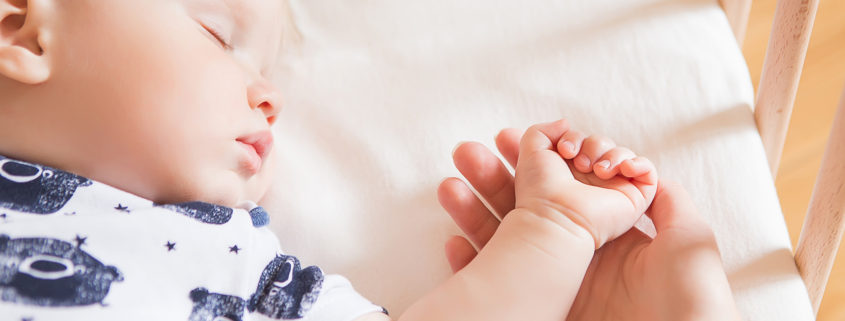




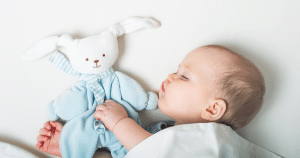








Leave a Reply
Want to join the discussion?Feel free to contribute!